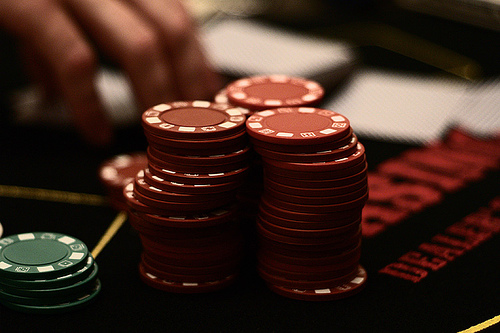 Over the weekend, Janet Morrissey of The New York Times posted an excellent article on the U.S. government’s continuing crackdown on Internet gambling. (“Poker Inc. to Uncle Sam: Shut Up and Deal“) Ironically, her article arrives on the same week during which PBS aired the terrific new Ken Burns and Lynn Novick documentary on the history of alcohol prohibition in the United States. It’s a highly-recommended look at the utter hypocrisy and futility of prohibiting a product that millions of people find enjoyable. If there’s a simple moral to the story of Prohibition, it’s that you can’t repress human nature–not for long, at least, and not without serious unintended consequences. Which is why Morrissey of the Times notes:
Over the weekend, Janet Morrissey of The New York Times posted an excellent article on the U.S. government’s continuing crackdown on Internet gambling. (“Poker Inc. to Uncle Sam: Shut Up and Deal“) Ironically, her article arrives on the same week during which PBS aired the terrific new Ken Burns and Lynn Novick documentary on the history of alcohol prohibition in the United States. It’s a highly-recommended look at the utter hypocrisy and futility of prohibiting a product that millions of people find enjoyable. If there’s a simple moral to the story of Prohibition, it’s that you can’t repress human nature–not for long, at least, and not without serious unintended consequences. Which is why Morrissey of the Times notes:
And so the poker world now finds itself in a situation many liken to Prohibition. America didn’t stop drinking when the government outlawed alcoholic beverages in 1919. And, in this Internet age, it won’t be easy to prevent people from gambling online, whatever the government says. “It’s a game of whack-a-mole,” says Behnam Dayanim, an expert on online gambling and a partner at the Axinn Veltrop & Harkrider law firm. “They’ve whacked three very large moles, but over time, more moles will pop up.”
Exactly right (except that it should be “whac” not “whack”! There’s no K in whac-a-mole.) It reminds me of the paper that my blogging colleague Tom Bell penned back in 1999 for the Cato Institute with its perfect title: “Internet Gambling: Popular, Inexorable, and (Eventually) Legal.” As Tom noted back then:
Consumer demand and lost tax revenue will create enormous political pressure for legalization, which we should welcome if only for its beneficial policy impacts on network development and its consumer benefits. We should also welcome it for a more basic reason: as the Founders recognized, our rights to peaceably dispose of our property include the right to gamble, online or off.
Again, you can’t hold back human nature and the effort of millions to pursue happiness as they see fit. It was true of alcohol and it will be true of online gambling–eventually.
And although it represents the worst argument for legalization, Tom was right about the tax revenue benefits as a primary factor leading to legalization. As Morrissey notes in her Times piece:
Uncle Sam is leaving a lot of money on the table. Over 10 years, legal online gambling could generate $42 billion in tax revenue, according to the Congressional Committee on Taxation. An estimated 1.8 million Americans played online poker last year, and some make a living at it. Because of the legal issues in the United States, online card rooms typically base their computer servers elsewhere, in places like Costa Rica or, in the case of Full Tilt, in the Channel Islands.
It was the same story back during alcohol prohibition, of course. All the “money left on the table” was snatched up by foreign governments and organized crime, who were all too happy to satisfy the thirst Americans had. Some State governments have already realized this and are taking steps to partially legalize online gambling and get in on the action, as Morrissey reports:
Oddly enough, Internet gambling is already legal in the nation’s capital. Earlier this year, the District of Columbia became the first jurisdiction in the United States to legalize it. Officials there said they hoped the move would bring in $13 million to $14 million a year in tax revenue. But Washington may only be the start. Several bills now working their way through the House of Representatives would give online poker the run of the country.
Again, as Bell’s paper argued, it’s popular, inexorable, and it will eventually be fully legal. We just have to be patient while some lawmakers play through this latest silly experiment in legislating morality.

 The Technology Liberation Front is the tech policy blog dedicated to keeping politicians' hands off the 'net and everything else related to technology.
The Technology Liberation Front is the tech policy blog dedicated to keeping politicians' hands off the 'net and everything else related to technology.